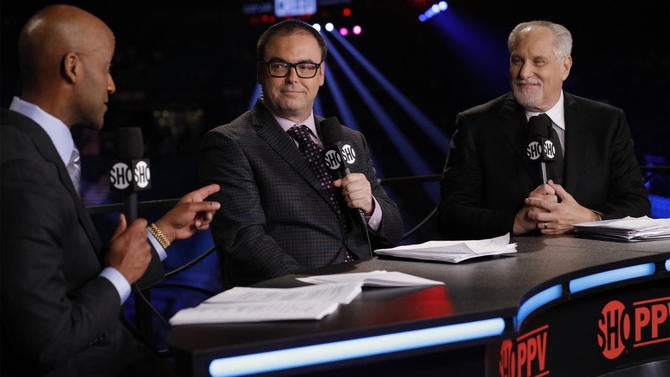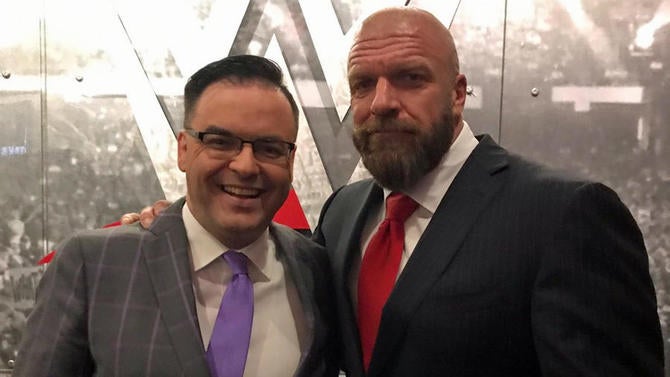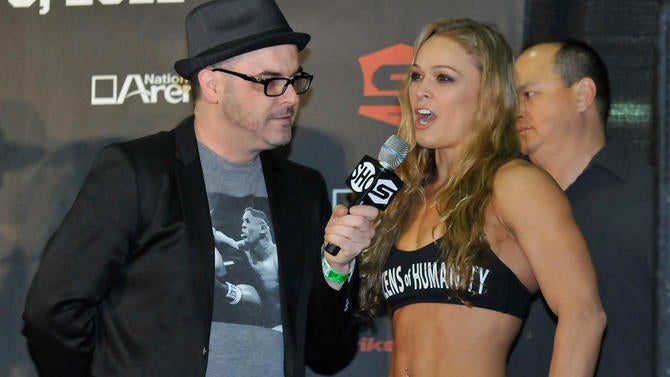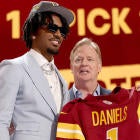NEW YORK -- If there was a moment when Mauro Ranallo regretted baring his soul to the world in such a vulnerable way, the feeling was as intense as it was fleeting.
Ranallo, the acclaimed combat sports announcer and subject of the Showtime documentary "Bipolar Rock 'N' Roller" (Friday, 9 p.m. ET), sat up in his hotel bed late Tuesday unable to sleep less than 24 hours before the red-carpet premiere of his film in Manhattan.
A mixture of fear and doubt began to engulf Ranallo, who shares his daily struggle with mental illness in the documentary. Thoughts raced through his mind. What have I done? Why did I do this?
This isn't a film that merely shares the devastating effects of bipolar disorder on Ranallo's life and career, it presents it visually in a manner that is both jarring and moving.
It was in that moment, with Ranallo consumed by the uncomfortable realization that he presented himself so naked and vulnerable, that the 48-year-old knew he had made the right choice.
"That's what I want; I want 'uncomfortable,'" Ranallo told CBS Sports this week. "I needed to do something that a lot of people maybe didn't expect that shows it first-hand in all its raw, unflinching and -- at times -- an incredibly uncomfortable viewing experience. Otherwise, I don't know why this would matter.
"I don't care what it cost me, whether it cost me future work, but I can't let another family get that phone call. I lost too many people to suicide for no other reason than no one would listen to them."
Subscribe to the "In This Corner" Podcast: iTunes | Stitcher | TuneIn
Like Ranallo's quirky personality, the film depicts his incredible journey -- from growing up on a chicken farm at a literal dead end in Abbotsford, British Columbia, to calling the two biggest events in modern combat sports history -- in a manner that is nothing short of manic. Through it all, the roller coaster is an emotional one with alternating moments of heartwarming humor and heartbreaking sadness.
Ranallo is quite possibly the most talented, successful and versatile broadcaster in the fight game today, able to shift in almost seamless fashion from calling boxing on Showtime and mixed martial arts with Bellator to showcasing his natural gift of theatrics as the voice of NXT, WWE's developmental promotion.
But the daily challenges of Ranallo's private life make his work anything but seamless or easy.
While he admits to always knowing he was different, both in terms of his mental state and an overriding feeling that he was destined for greatness in his career -- one which began at age 16 as a professional wrestling commentator in Vancouver -- the reality of Ranallo's illness didn't become clear until he was diagnosed at age 19 shortly after the sudden death of his best friend, Michael Janzen, in 1989.
The life-changing moment sent Ranallo into a tailspin. While he was able to get consistent work as a radio and night club DJ, he describes his 20s as nothing short of hell due to numerous hospitalizations (including one three-month stay) and failed attempts at self-medicating through drugs, alcohol and promiscuity.
Ranallo's highs were always as sky-scraping as his lows were Earth-moving, and tremendous broadcasting opportunities always seemed to follow his worst moments. His most recent breakdowns occurred before he called the landmark Floyd Mayweather-Manny Pacquiao boxing match in 2015 and his much-publicized exit from WWE's SmackDown Live in 2017 after the grinding travel schedule became too much to bare.
Ranallo's lows were depicted in the film in such an uncensored manner that the original cut became difficult to watch for Showtime Sports president Stephen Espinoza, who green lit the project one year ago and admits his first impulse was to protect Ranallo.
"My instinct was to pick up the phone and say, 'Are you sure you want to do this? Maybe you should pull back. You're a public figure, and you have a professional reputation. Are you sure?'" Espinoza told CBS Sports.
That's when Espinoza stopped in his tracks.
"I realized that my [trepidation] added to the urge of what he's battling against and the stigma that he speaks about very eloquently," Espinoza said. "By comparison, if he had delivered to us a documentary about his lifelong battle with cancer or diabetes or any other ailment virtually other than mental illness, I certainly wouldn't have called him and said, 'Maybe you should pull back on the hospital footage or the cancer treatment footage.'
"What that says to me is that there are unconscious ways that we stigmatize the illness. I consider myself a fairly sympathetic person and hopefully a sympathetic boss, and I was unwittingly playing into that stigma."

It's the stigma, Ranallo believes, that has caused too many people, particularly men, to commit suicide due to the macho culture ingrained into society which favors avoiding weakness to sharing your true feelings. Over the past 30 years, Ranallo has heard it all from those closest to him in attempts at encouragement and compassion that were often handcuffed by a lack of awareness for the disease.
"You are looking for attention, you are lazy, snap out of it, go get some fresh air, it's all in your head," Ranallo said. "Yes, actually it is in my head because it is the invisible illness. I just want to make it OK to not be OK. The more we talk about it, the more lives we will save."
It's because of that same stigma that Ranallo often campaigned to executive producer Brian Dailey about pushing the envelope even further than they ultimately did in the film as he hoped to use as much raw footage shot by director Haris Usanovic to educate the viewer as to just how debilitating the disease can be.
Usanovic, an aspiring filmmaker from Bosnia, first met Ranallo in 2006 while the two worked at the Fight Network in Canada. They became fast friends, which led to many nights hanging out at Ranallo's apartment. That's when Usanovic saw first-hand the contrasting reality of light and dark in which Ranallo dwelled.
"I called his apartment 'the situation room,'" Usanovic said. "I was traumatized, and I was blown away by the experience. He just started playing the piano and freestyling about my life and things I told him earlier in the day. I always wanted to tell stories and be a filmmaker, and it's really hard when your good friend has the most interesting story. I didn't want to share him with anyone."
Finally, in 2012, Usanovic began regularly documenting their time spent together both leisurely and by Ranallo's side on the road. Usanovic admits that many times Ranallo wasn't fully aware a camera had been turned on.
Usanovic eventually discovered what he considered "a gold mine" when he visited Ranallo's childhood room. In a bunch of boxes under his bed, the director found a treasure trove of VHS tapes featuring both Ranallo's early work as a local teenage broadcaster and home movies from his 20s that vividly illustrated his manic behavior.
The project eventually hit a crossroads, however, which led to a chance meeting with Dailey in 2015 before Mayweather-Pacquiao in Las Vegas, just as Ranallo was enduring an episode which threatened the biggest night of his career.
"I became aware of what Mauro was battling [that weekend]," Dailey said. "We shared some stories, and I told him I can relate. It's in my family, and I get it. He told me I had to meet Haris, and he shared with me the footage that we see now, which was just captivating and scary."
Dailey, who calls the film his most rewarding work, helped construct a five-minute pitch video that was shown internally to Showtime executives and mixed martial arts legend Frank Shamrock, Ranallo's close friend and manager.
"Everyone who saw it was blown away," Dailey said. "There was no pushback on it and no notes. That was probably the first moment where I knew we would be good. For us, it was realizing we had something truly special in that you hear a lot of people talk about [mental illness] and write about it, but no one has ever shown it. We were put into a position where we had this really powerful stuff to show for the first time."

While the film was never lacking for material, it did not have a proper ending. Enter 2017, one of the most significant years for major events in combat sports history. It was also a year that Ranallo, through a constant stream of serendipity that has come to define his career, found himself in the middle of nearly every one.
Throughout an eight-month stretch to open the year, which Dailey refers to it as "the gods aligning," Ranallo called the WWE match of the year (John Cena vs. AJ Styles) at the Royal Rumble in January, April's Anthony Joshua-Wladimir Klitschko heavyweight boxing championship in London, a Bellator pay-per-view at New York's Madison Square Garden featuring Fedor Emelianenko in July, and the Mayweather-Conor McGregor crossover superfight in August. Showtime cameras were embedded with Ranallo each step of the way.
The film culminates with Ranallo living his childhood dream of working a WWE card during WrestleMania weekend this past April when he called the epic NXT TakeOver: New Orleans event.
During a particularly chaotic sequence in which the action spilled onto his announcer table, the New Orleans crowd -- unable to hear his commentary live -- began to organically chant Ranallo's catchphrase "Mamma Mia," which he uses as a tribute to his mother Duilia.
Ranallo's track record of being present for big moments has led Espinoza to call him "Forrest Gump." It has also helped Ranallo quickly compile a broadcasting resume that is literally unrivaled.
"Just the events he has covered alone since his first call for Showtime boxing [in October 2012], from the first live boxing card at the Barclays Center in Brooklyn featuring four title fights to Mayweather-Canelo [Alvarez] to Mayweather-Pacquiao and Mayweather-McGregor, would be a ridiculous career unto itself. And that has just been five years," Espinoza said.
That also doesn't take into account how Ranallo first built his name globally in the sport of MMA, first as the voice of Pride in Japan and then with Elite XC and Strikeforce, including the first MMA events to air in primetime on network television with CBS.
Ironically, it was Ranallo's personal rock bottom moment in 2003 that produced the opportunity with Pride and also planted the seed in his heart that one day he would grow to help others afflicted with the same disease.
After living in the Calgary basement of friend and kickboxing promoter Keith Crawford, who hired him as an announcer, Ranallo was asked to leave when his mental condition became unstable following a breakup with his girlfriend. After Ranallo's father and brother drove to Calgary to pick him up, he collapsed on the floor of his childhood home thinking his life was over. That's when his parents played for him a voicemail from former UFC champion Bas Rutten, who was gauging his interest to become the voice of Pride.
"That's when I said, 'Enough is enough, I will surrender,'" said Ranallo of his decision to willingly seek out treatment. "[I said,] 'Do whatever you have to do to me but this is the last time. If it works, it works. If not, I'm out of here.' And two weeks after being hospitalized, I'm in Japan calling Pride championships. I haven't looked back since."

Ranallo has long called his bipolar disorder a blessing and a curse in terms of its effect on his career. For all of the anxiety and fear brought on by the disease, it has also fueled his unique delivery, savant memory and almost sadistic work ethic.
Rutten, who joined Ranallo on the call in Pride and went on to become a good friend and podcast co-host, remembers getting an early glimpse.
"Literally, the first job he had a [bipolar] episode in Pride in the first show," Rutten said. "Just before we go live on the show, he's still doing these weird things [with his hands], and nobody knows if he's going to be OK. And suddenly, when the light goes on, it's 'Mauro time!' That's it and there's no mistakes and he just keeps going.
"It blew me away the first time I met Mauro. We had to memorize a six-page script [for a film]. I was there already for 20 minutes, and I'm going over my lines. Mauro walks in, and within five minutes, he throws the script away and says, 'When are we going to do it?' I said, 'How did you do that?' Right away I knew something is up with this guy."
Ranallo is remarkably open about how close he has come to taking his own life, sharing how often he has stared at the ceiling wondering if the fan above his bed could hold his weight. Age and wisdom have certainly helped him manage things better as a whole, yet the constant urge to self sabotage always seems to be around the corner. Not only does Ranallo credit the use of cannabis -- which he acquires legally for medicinal use as a resident of California -- to help regulate his emotions and spark creativity, he also believes it's his busy work schedule that keeps him alive.
Work may not be the healthiest of addictions due to the lack of balance it creates in his life, but Ranallo is introspective enough to understand that the time he spends under a headset and in front of a camera gives him a feeling of comfort and joy that he is simply unable to duplicate throughout the daily monotony of living.
"Like Linus in the 'Peanuts' [cartoon] strip had the security blanket, the headphones and the microphone are my security and what I feel then is the most alive I think I can be," Ranallo said. "There is no net. It's live TV. There is adrenaline. You are the center of the universe. There is a rush. This is your show, and now it's time to deliver. All my attention goes into that, and it's like I need that constant IV of adrenaline and stimuli."
While the film accurately presents the negative side of mental illness, Ranallo hopes those who share his disorder can also find comfort in celebrating its gifts. Free agent wide receiver Brandon Marshall, a Showtime colleague of Ranallo's on "Inside the NFL," has been outspoken about his own battle with borderline personality disorder and talked about the brighter side following Tuesday's premiere.
"I think one of the most amazing things about this film is we see the diminished potential and we see bipolar disorder. But if you look a little deeper, you see excellence, you see brilliance," Marshall said.
"The greatest minds, the most talented people in the world, if you were to do your individual research, many of them -- or maybe the majority -- are touched by what Robin Williams called 'madness,'" Ranallo said. "There is a beauty and that beauty is the creative freedom. There is a lot to be celebrated and I don't see why it has taken this long to get to this point."
Ranallo's true gift is his intoxicating level of passion. It's a strength that is best showcased through the lens of pro wrestling, which was Ranallo's first love and entry into broadcasting. It also represents a living connection to his late friend Janzen, a huge advocate for Ranallo's talent, who told him shortly before his death that Ranallo would one day work for WWE chairman Vince McMahon. In 2016, at the age of 46, that dream came true for Ranallo.
As the heart and soul behind NXT, which has developed a cult following and only grown stronger since his addition as lead announcer, Ranallo has found his perfect fit.
"Mauro is phenomenal," WWE executive Paul "Triple H" Levesque told CBS Sports in March. "I love working with people that are passionate about what we do. Mauro wears that passion on his sleeve. I love watching Mauro call matches."
Ranallo often becomes so animated when calling the action that Levesque wanted to capture it for fans to see and did so during NXT TakeOver in New Orleans, with cameras catching Ranallo literally jumping out of his seat during big spots.
"He is like the most enthusiastic fan in the arena," Levesque said. "He is out of his seat, he is on the edge of his seat, he's jumping up! I wouldn't want to sit next to him because he would probably end up beating you up the whole night. But he is just so passionate, and I love that."
Ranallo's passion is so intense it simply can't be faked, which is why Rutten takes umbrage with any of his friend's critics who claim Ranallo uses a fake voice or attempts to over-sell big moments.
"When you see the movie -- and I have goosebumps now just saying this -- you are going to realize that's just him," Rutten said. "If he was a method actor, he will be Daniel Day Lewis. That's how invested he gets. I think every fighter, every WWE personality, they all want him to commentate because he makes them. He's invested 100 percent, not 99."
Current NXT superstar Johnny Gargano believes its Ranallo's transparency as a person and willingness to do everything with heart and passion has made him endlessly beloved by wrestling fans and performers alike. In January, Garagno joined Andrade "Cien" Almas in producing what some have called the best match in the history of the promotion at NXT TakeOver: Philadelphia. He credits Ranallo's call for fueling it to that level of acclaim.
"I wouldn't be where I am at today if it wasn't for a guy like Mauro Ranallo," Gargano said. "He puts a soundtrack on what I do; he tells my story. He says things like, 'Someone check Johnny Gargano's DNA,' which made me sound like a superhero. That's why I think the marriage of Mauro Ranallo and NXT is such a beautiful combination. I tell him this all the time that I think he's the voice of our generation, and I also tell him that he makes me seem a lot cooler than I really am, so I thank him for that."
Ranallo, who points out that one in five Americans will suffer from a mental health disorder in their lifetime, said the timing of the documentary's release during Mental Health Awareness Month is no coincidence. He hopes to combine the reaction from the film and his platform as a public figure to springboard toward a long-term career in advocacy. Ranallo deems this as his life's true calling.
What that might look like is still being considered, but Ranallo hopes to become a "male Oprah [Winfrey]" who uses various technology platforms, including podcasts, to share the mental health stories of others in a way that is entertaining and educational. He also hopes to create an annual event modeled after the Coachella Valley Music and Arts Festival in California, combining artists and celebrities who are outspoken in their mental health crusades to join with the public in celebrating the good.
If the early reaction from the release of the film's trailer is any indication, Ranallo believes it has already succeeded in starting conversations and raising awareness, including for those who feel they lack a voice or support system. In fact, Ranallo has already received hundreds of messages, including from some who claim viewing the trailer alone saved their life.
While the reaction has been humbling, it has also been overwhelming at times. It's something Ranallo welcomes, which is why he publicly shares his email address encouraging anyone battling mental illness who is in need of encouragement or a lifeline to reach out. Every email, every Twitter direct message, he reads and responds to personally.
"It's an incredible burden in some sense," Espinoza said. "There are ways in which it's very gratifying to know, 'Thank you for voicing what I have been thinking and feeling.' But he also gets now dozens of emails weekly of, 'I'm suicidal, what do I do? How do you find the strength?' He has become sort of a lighthouse for people. It's one of the difficult things that he has had to struggle with in terms of the outpouring. I think it speaks to his availability and there is so few role models and public cases of people coming out."
If all it took was him showing a little vulnerability to create this type of change, Ranallo believes our society can reach even greater benchmarks collectively.
"Frank [Shamrock] says it in the film that this will be [Ranallo's] legacy and that he's capable of changing the world," Dailey said. "You hear that and it's a pretty drastic statement, but I think he's right. I think he's capable of changing the world, and it's inspiring to all of us. He's different than us, but he's not in a lot of ways. We are all capable of doing this."
Asked what type of metrics he is using to determine whether the film is a success or has made an impact, Ranallo referred to the fact that it was even made as a tremendous achievement.
"We always ask each other, 'How are you?' Does anyone really listen to that question? Does anyone really answer it?," Ranallo said.
"We have to start having that question and answer become more authentic, and we need to start treating mentally ill people like people. I have been protected by all the love and support I get from so many people, and I want to pay it forward."
"Bipolar Rock 'N' Roller" airs Friday at 9 p.m. ET on Showtime.





















